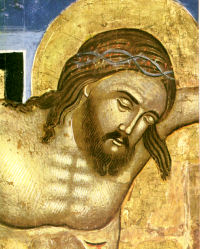VATICAN INSIDER
03/18/2012
St. Joseph: Patron saint of three popes

PORTRAIT OF ST. JOSEPH BY GUIDO RENI
The feast of St. Joseph, Mary’s husband, is linked to the lives of three great Popes
MICHELANGELO NASCAROME
In a letter written to his grand-daughter in April 1949, during his time as Apostolic Nuncio to Paris, Mgr. Angelo Giuseppe Roncalli, defined St. Joseph as “the diplomat saint who knows when to keep quiet and speaks with moderation and always with great generosity.” This definition or rather, the main programmatic aspect that influenced the lives of Roncalli and the future John XXIII. As the Catholic Catechism (no. 2156) recalls: The patron saint provides a model of charity; the baptised person is assured of his intercession. Thus, in Roncalli and also Joseph Ratzinger, one can clearly make out characteristics of their respective patron Saints. In April 1947, Bishop Roncalli wrote to his brother: “There was never a time when St. Joseph did not listen to my prayers. Looking closely at my life, it bears similarities to his. Amongst these scribes and Pharisees – as you call them – I have the task of presenting and defending the Lord. Is that not so?”
A few years ago, Benedict XVI illustrated the experience of Christian prayer with the image of “inner silence”, recalling the figure of St. Joseph: “His, is a silence permeated by contemplation of the mystery of God, entrusting himself totally to divine will. In other words, St. Joseph’s silence is not the sign of a hollow interior, but of the fullness of faith which he carries in his heart and which guides all his thoughts and actions [...] It was from his “father” Joseph that Jesus learnt - on a human level – that strong interiority which is a condition for authentic justice, that “superior justice” He would one day teach his disciples (see Matthew 5:20).”
The Pope’s words emphasise St. Joseph the Patriarch’s main vocational identity. It would be wrong to consider Mary’s husband as a marginal presence in Christ’s educational growth. Joseph is called - together with the Mother of God – to look after and raise the Son of God, through a very personal act of obedience. It is Joseph who helps us understand to what lengths God will go to ask his creations to surrender themselves completely to His will.
The task Joseph is called to fulfil, is that of making space for God, because it is through his personal “authorisation” that the mystery of salvation can be accomplished through the incarnation of Christ. St. Joseph’s fertility is essentially his willingness to give himself up and to embrace God’s will, in its entirety.
Another great Pope – renowned for his personal devotion to Mary - also bears St. Joseph’s name: the Blessed John Paul II.
In his writings, Pope Wojtyla often referred back to the spiritual benefits which the charisma of Carmel had given him during his vocational growth. We also know that Pope Wojtyla always carried the Brown Scapular he was consecrated with, wherever he went. But there is another, perhaps less known detail which confirms the spiritual attention that linked John Paul II to Carmelite history. On 16 October 2003, Karol Wojtyla gave his papal ring as a gift to the convent - founded by the Carmelitan Raffaele Kalinowski - in his home town Wadowice, where the Pope often used to pray. He did so in order to decorate the picture of St. Joseph, whose name he bears (Karol Józef Wojtyła was the name the Pope had been baptised with). Wojtyla recognised St. Joseph as the second patron saint of his Baptism, devotedly praying to him “every day.”
John Paul II’s papal bull reads: “[...] In the city where I was born, St. Joseph, the Patron Saint of my Baptism, bestowed his protection on the People of God in the Discalced Carmelite Church ‘on the hill’, where his painting is venerated above the high altar, the Pope wrote. “I offer the papal ring, in the 25th year of my pontificate, for a similar decoration of the painting of him who nourished the Son of God, venerated in the Carmelite Church, Wadowice. May this ring”, he added, symbol of married love, which will be placed on the hand of St. Joseph in the painting of Wadowice, remind his devotees that the Head of the Holy Family is ‘that just man of Nazareth who possesses the clear characteristics of a husband….and remained faithful to God’s call until the end….and received the same love, through whose power the Eternal Father has predestined us to be His adopted children through Jesus Christ.” (Redemptoris Custos, 1: 17-18).
“May the Discalced Carmelites, faithful custodians of the church of Wadowice, in accepting my gratitude for all that I received from the Carmelitan school of spirituality during my childhood, following the example of their Holy Mother Teresa of Jesus, contemplate in St. Joseph, the perfect model of the intimacy with Jesus and Mary, Patron of inner prayer and of tireless service to one’s brothers (see Vita, 6: 6-8 ; 32, 12). ”
l meeting with the faithful
















